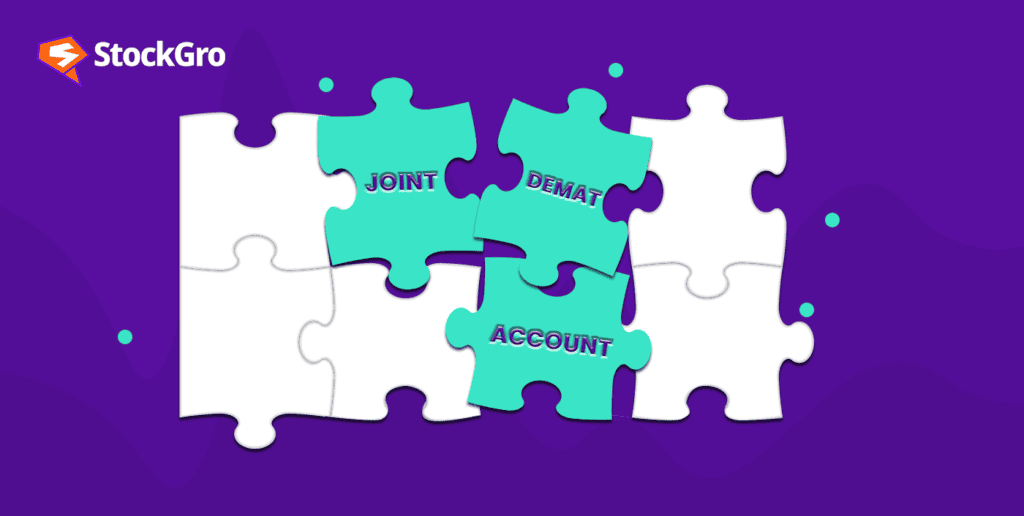
Opening a demat account is the first step towards your investment journey in financial markets. Brokerage firms allow investors to open different kinds of demat accounts to serve various purposes.
Today’s article deals with one such unique type of demat account that allows investors to join hands and trade together. So, if you intend to open a joint account, this article takes you through the features, benefits and steps to open a joint demat account.
Also Read: NSE considers extending trading hours
What is a demat account?
A demat – dematerialised account helps investors hold their shares as digital securities. Every investor or trader must own a demat account with a trading account to transact in the stock market.
Brokerage firms that act as depository participants facilitate investors to open demat accounts using their platforms. They then work with depositories like NSDL (National Securities Depository Limited) and CDSL (Central Depository Securities Limited) to transfer shares between traders and companies.
Depository participants allow investors to open different types of demat accounts like minor accounts, joint accounts, basic service demat accounts, repatriable accounts, etc., each offering a different set of features to meet the investors’ needs.
What is a joint demat account?
A joint demat account, as the name suggests, is jointly held by multiple investors. The same demat account is used for debiting and crediting securities concerning transactions made by different holders of joint accounts.
Also read: NSE considers extending trading hours
Features of a joint demat account
- A joint demat can have a maximum of three holders, with one investor being the primary holder.
- Though every holder has equal authority to transact using the demat account, it requires the approval and acknowledgement of other holders.
- Holders are not required to pay individually to maintain the demat account. A joint fee is paid annually on behalf of all the holders.
- The details of holders cannot be modified once the account is opened. There can also be no deletion or addition of members from the account. In case of the death of a holder, the remaining holders continue to hold the joint demat account.
Is a joint demat account valid?
It is not sufficient to have a demat account alone to start trading in the stock market. A trading account is equally essential. While the trading account allows investors to buy and sell shares, the demat account allows traders to store them.
Having a joint trading account is not allowed in the country, because it is linked to the investor’s PAN. However, having a joint demat account is valid. So, all investors sharing one demat account must own individual trading accounts to transact in the market.
Can you hold a joint demat account with a minor?
No, a joint demat account must have all holders above 18 years of age. You can, however, be a guardian to a minor’s demat account, though it does not classify as a joint demat account.
Also read: What are financial securities? Examples, types, and importance
How to open a joint demat account online?
A joint demat account cannot be opened online. It is an in-person activity.
Before understanding the steps, let’s go through the documents required for a joint account:
- The most basic document required is the proof of identification and address like Aadhar card, passport, utility bills, etc.
- Income proof – A copy of ITR acknowledgement, cancelled cheque, and PAN card
- Passport size photographs
While these are the primary documents, each brokerage firm may have additional requirements.
Steps to open a joint account:
- Choose your brokerage firm and print the application to open a joint demat account.
- Fill in the details of all the investors. The primary holder’s address is essential as that is where all relevant communications are sent.
- Submit the signed application form along with all the required documents of all the investors.
- Wait for the depository participant to verify the details and approve the account.
- Once approved, the demat account will be available for transactions.
Pros and cons of joint demat account
Benefits:
- Holding a joint account allows investors to pool more funds and invest together. Combining money, knowledge and skills can help investors in making profitable and wise decisions.
- Stock market transactions require constant monitoring of share prices and the whole market. This is not always possible, given other commitments of investors. A joint demat account helps investors compensate for each other and share responsibilities.
- One of the disadvantages of trading as a retail investor is the high cost associated with trading. Brokerage costs, maintenance and membership fees are generally high, which leads to compromised profits. A joint demat account comes in handy here as the fees are shared among all holders equally, reducing the cost per holder.
Limitations:
- A joint demat account requires approval from every holder to initiate a transaction. While this feature is beneficial in terms of security, it can have a negative impact too. Initiating and settling transactions becomes time-consuming and burdensome since it requires the approval of each holder.
- While working as a team has benefits, it also leads to the obvious issue of disagreements and disputes. Joint demat accounts do not offer the flexibility to add new people to the existing account. Closing the account will also require signatures from every holder. The rigid rules in maintaining the account can cause delays and inaccurate decisions.
Bottomline
A joint demat is a facility that allows a maximum of three investors to store their securities together in the same account. Having a joint demat account requires every holder to approve transactions, thereby, making trades safe and secure.
So, if you know an investor with the same thought process as yours, you may consider trading together by opening a joint demat account.

